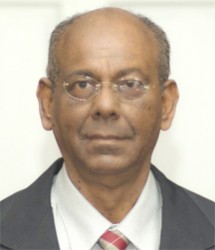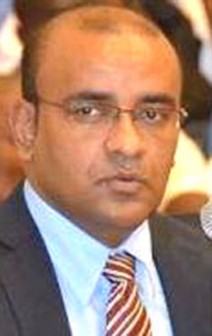In 2010, then President Bharrat Jagdeo had proposed a judicial solution to end the border controversy to then Venezuelan President Hugo Chávez, former Guyana Facilitator to the Good Officer process Ralph Ramkarran has disclosed.
When contacted yesterday by Stabroek News on the matter, Jagdeo, now the leader of the opposition, said that he was overseas and had not read the column.
Last month, Jagdeo had raised concerns about whether the David Granger administration’s strategy for a juridical settlement of the controversy was the best option or even available but had made no mention of his own proposal. Jagdeo had also said that while his party stands firmly with the government on the border controversy, he is not sure that its decision to approach the UN for a juridical settlement is within that organisation’s ambit.


Guyana is insisting that the controversy be settled juridically, while Venezuela wants the Good Officer process to continue. President Granger and other government spokesmen have noted that the process had run its course without yielding results. Recently, UN Secretary General Ban Ki-moon sent investigative teams to Georgetown and Caracas after which they will report to him and he will make a decision on the way forward.
Jagdeo had also said that his PPP/C government had explored the option of granting Venezuela a channel through Guyana’s Atlantic waters as a means of settling the long-running border controversy, which escalated in May this year.
Last week, former president Donald Ramotar told Stabroek News that during his term, he had rejected the idea of a channel through Guyana’s Atlantic waters as a means of settling the border controversy and said that Jagdeo should not have voiced that option. He also said that his government had decided to ask the UN for a range of options to settle the border controversy because the Good Officer process had been exhausted.
In his column in the Sunday Stabroek yesterday, Ramkarran revealed that Jagdeo had proposed a judicial settlement to Chavez. “Jagdeo never mentioned, contrary to the dangers he now perceives and to his current advice, that he proposed to President Chávez as far back as July 21, 2010, at their meeting in Caracas that serious consideration should be given to having the controversy resolved legally through the International Court of Justice (ICJ),” he wrote.
Ramkarran pointed out that Jadgeo questioned the ‘juridical’ route being proposed by the government on the ground that it may not materialize because of the need for Venezuela’s consent. In addition, Jagdeo warned that if the parties accepted a judicial solution, the involvement of the UN in the process might somehow be impaired. He urged that Guyana ought not to take a position that would have such a consequence because it was vital, in his view, that the Secretary General should remain involved in the process, Ramkarran noted.
Puzzling
But, he argued that Jagdeo never mentioned his proposal to Chavez. He also said that Ramotar’s statements suggest that he was unaware of the Jagdeo proposal to Chávez and this was very puzzling.
“President Jagdeo could not have taken any legal or other appropriate advice before making the proposal. It appears as if he has not taken any since. If so he would have known that Venezuela’s concurrence was not needed and that the UN Secretary General could refer the matter to the ICJ of his own motion under the Geneva Agreement,” Ramkarran declared.
“Several questions arise. Did Mr Jagdeo recognise the danger he now warns about when he made the proposal to Chávez? If so why did he make it? Would this not be considered to be reckless, going into a situation with eyes closed, floundering into the darkness? Or did he seek advice and had some plan to overcome it, which he does not wish to disclose,” he questioned.
“Why was Mr Jagdeo economical with the facts to the Guyanese people? Why did he not tell us that he had made the proposal for a judicial settlement to President Chávez? Why did Mr Jagdeo reveal his position on the outlet to the Atlantic but conceal his proposal for a judicial settlement to President Chávez? How come he did not consult with the opposition in 2010 on this matter of fundamental national importance? How is it possible that the Ramotar government did not know about the proposal? If it did, what explanation is there for the Head of the Presidential Secretariat informing the Guyanese people in early 2015 that the judicial settlement was only then being considered by the PPP,” the former Speaker of the National Assembly questioned further.
While saying that he would prefer not to repeat Ramotar’s admonition to Jagdeo that he should have shut up, Ramkarran urged the opposition leader to do “some serious introspection before he speaks again, because his credibility on the vital national issue of the Guyana Venezuela border controversy, aggravated by his apparent lack of understanding of the Geneva Agreement, is now at stake.”
As for Ramotar, some explanation is needed as to whether he knew of the Jagdeo proposal, Ramkarran said. “If he knew why did his government not reveal it but give the impression that it was only now considering it?” he questioned.
Ramkarran wrote that the above questions will always arise when matters, especially those of national importance, are treated with stealth and secrecy. “This is necessary in some cases, but the Jagdeo proposal to Chávez is not one of them. Even though I was the Guyana Facilitator to the Good Officer process, I was unaware of Mr Jagdeo’s proposal to President Chávez at the time and for some time after,” he said. According to Ramkarran, from about 2006 to the end of the Ramotar administration in May 2015 he was, not of his own volition, not part of the advisory process relating to the Guyana/ Venezuela border controversy.





